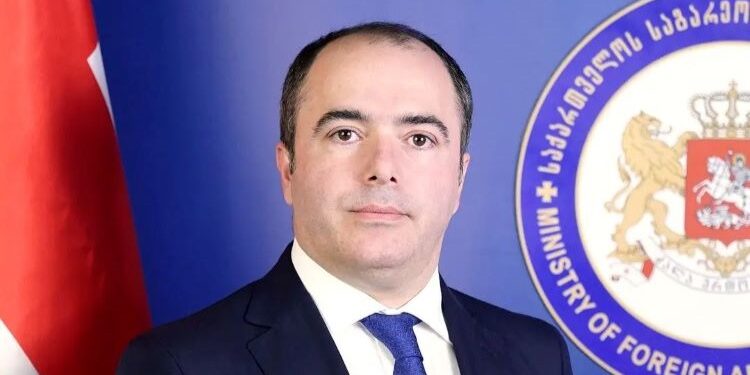Eduardo González
The former Consul General of Georgia in Barcelona, Aleksandre Chkuaseli, has been appointed his country’s ambassador to Madrid, where he presented the Copies of Style of his Letters at the headquarters of the Ministry of Foreign Affairs this Monday.
Aleksander Chkuaseli, 45, whose appointment was announced on April 3, has held various positions in the Georgian Ministry of Foreign Affairs since 2003, including Head of Division for High-Ranking Delegations in the Department of Diplomatic Protocol (2016-2021) and Director of the Press and Information Department of the General Directorate of Information and Public Relations (2021).
From 2021 to the present, he served as Georgia’s Consul General in Barcelona, where he covered the autonomous communities of Asturias, Cantabria, the Basque Country, Navarre, Aragon, Catalonia, Valencia, and the Balearic Islands. Georgia and Spain established diplomatic relations in 1992, and Georgia has had an Embassy in Madrid since 2005 and a Consulate General in Barcelona since 2021. Georgia’s previous ambassador to Spain, Ilia Giorgadze, completed his mission in February 2024, after nearly six years in the post, replacing the current Secretary-General of UN Tourism, Zurab Pololikashvili.
In contrast, Spain lacks a resident embassy in Tbilisi despite commitments from several foreign ministers to open a representation in the country. In June 2019, the government opened a diplomatic office in Georgia, and since then, the Ministry of Foreign Affairs has repeatedly promised that it would become an embassy.
In 2015, Spain posted a permanent diplomat in Tbilisi who serves as the ad interim chargé d’affaires under the Spanish Embassy in Turkey, from where the representation is exercised under multiple accreditation. Furthermore, there is an honorary consul for Spain in Georgia.
Aleksander Chkuaseli arrives at the Embassy in Madrid at a delicate moment for his country’s diplomatic relations with Spain and the European Union as a whole. Last October, the Spanish government asked the Georgian authorities to explain the “irregularities detected” in the legislative elections, following the conclusions of the OSCE observation mission, which reported threats, harassment, and violence against the ruling Georgian Dream party during election day.
Georgian President Salomé Zourabichvili herself rejected the results, which gave 54% of the vote to the pro-Russian Georgian Dream party, and called on citizens to take to the streets in protest, warning that these elections would “legitimize Russia’s control over the country.”
In July 2024, Brussels indefinitely suspended the accession process of Georgia, a candidate country since December 2022. At the last EU Foreign Affairs Council, held on February 24, High Representative for Foreign Affairs and Security Policy Kaja Kallas denounced “the adoption of repressive legislation and the excessive use of force against protesters” and warned that these measures “do not bring Georgia closer to Europe.”






